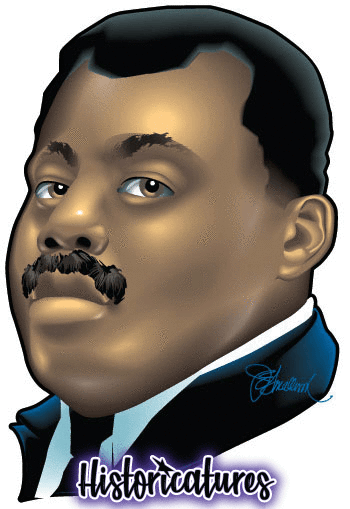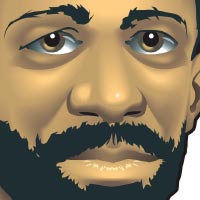
“I am the equal of any white man.
I want you to feel the same way.”
|
|
|

Marcus Garvey
(1887-1940) — Jamaican Political Leader, Publisher, Journalist, Entrepreneur, Black Nationalist, Pan-Africanist
By Bob Hilson
Marcus Mosiah Garvey was known as the “Negro Moses,” for he was a gifted orator and leader who envisioned that people of African descent would one day return to their homeland and establish an independent nation.
A movement in the early 1900s known as “Garveyism” advanced his beliefs that African descendants in the diaspora “redeem” the nations of Africa. Garvey’s goal was to create a vibrant, self-sufficient continent that one day would be run solely by native Africans.
His reasoning was straightforward: Dark-skinned people were more than capable to exist without the help or interference of white people.
Africa was in demise, he said, because of the thousands of native Africans who were kidnapped from their homeland and taken to other parts of world — and the continent could only be restored when once again inhabited by a majority of people of African descent.
But, when asked once while in the United States if he would like to see all ethnic Africans returned to Africa, Garvey said: “We do not want all of the Negroes in Africa. Some are no good here, and naturally would be no good there.”
Born in Jamaica in 1887, Garvey organized the Universal Negro Improvement Association (UNIA) and the African Communities League in 1914, which both championed Black Nationalism and Pan-Africanism.
Back to Africa
He came to the United States in 1916 and established the first UNIA division in New York a year later. His black nationalist “Back to Africa” message resonated among blacks in the United States and the UNIA established 700 chapters in 38 states by the early 1920s.
In 1918, Garvey and the UNIA began the Negro World, a newspaper with a circulation that quickly grew to more than 200,000 worldwide. The paper united black communities on three continents, as it featured articles and commentary on global events that were significant to people of African heritage.
He later founded the Black Star Line, an international shipping company designed to provide transportation and encourage trade among the black businesses of Africa and the Americas.
Garvey’s belief in black independence and self-sustainability spurred the births of other Pan-Africanism organizations, including the Nation of Islam and Rastafarian movements.
But Garvey was not without his detractors. Noted African American scholars, including W.E.B. DuBois, believed that Garvey’s views were too separatist and harmful to race relations.
Garvey died in London in 1940. A month before his death, he read an obituary proclaiming that he had already died. The obituary was the ultimate indignity. had already died. The obituary was the ultimate indignity.
Garvey died without ever going to Africa.
|











